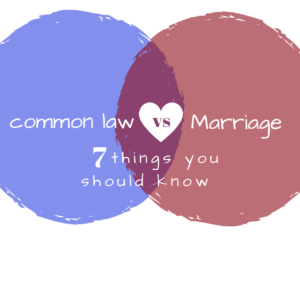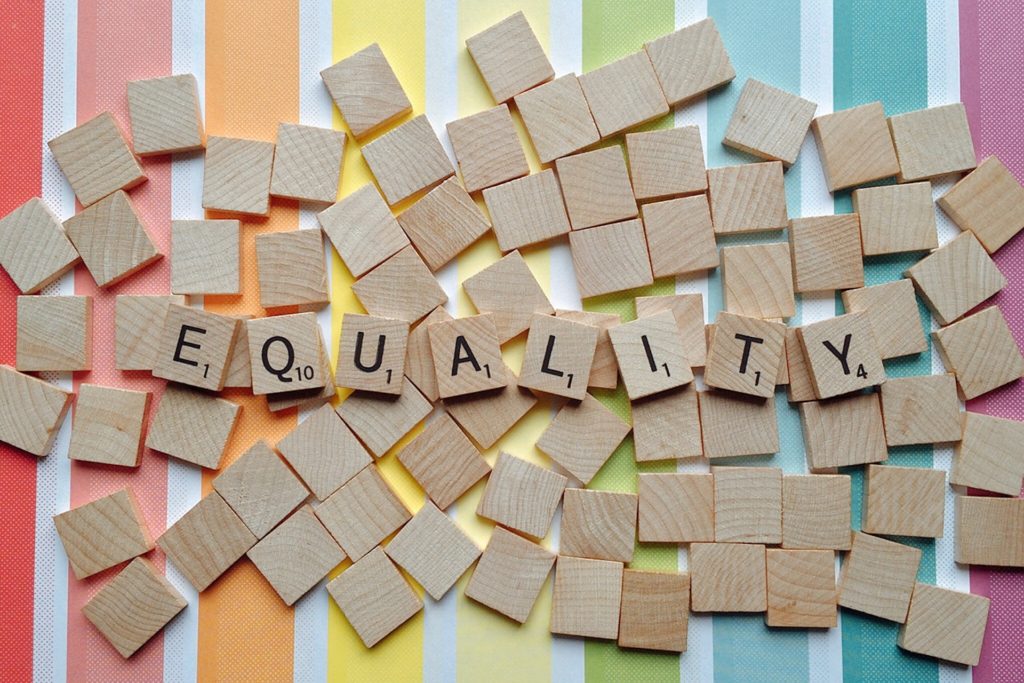
Let’s face it – we’re at that stage of our lives where we are committed.
Maybe you got hitched (and spent a ridiculous amount of money on the wedding) or maybe you’ve lived together so long you’re practically married – I mean isn’t common law the same as marriage anyway without the price tag of a glitzy wedding?
The answer is no. Common law is not the same as being married.

According to the Family Law Act (the “FLA”), marriage is an economic partnership. Remember “for better or for worse?” ‘Till death or divorce do us part?
Married spouses are required to share in each other’s financial ups and downs.
And not to be that person who keeps talking about death (see blog post: 13 reasons why you should write that will) but the reality is that your marriage could end in death (or divorce) and we’ll look at both of these.
Nearly half of Canadians feel “marriage is simply not necessary” but it kind of is and here are 7 things you should know about being married vs. common law.
1. The one thing marriage and common law have in common

Married folks and common law spouses both have the same right to ask for spousal support.
To non-married folks, this duty of support only comes after three years of cohabitation. It may come earlier if you are in a relationship of some permanence and have a child together.
If you’re married, and the relationship ends or your spouse dies, you also get support – this is even if your spouse keels over 2 seconds after signing the marriage papers (which we hope won’t happen).
Your length of the relationship, financial circumstances and the roles you took on while together (eg. raising children) are all relevant factors when looking at support.
If you have children together and they are the natural/adoptive parent, you can get child support.
2. I’m all ‘bout that title, that title, no treble

Title is a fancy way of saying ownership.
Title is like saying: who owns this?
Title – who legally owns the property – matters. Plain and simple. Two or more people can be on title.
It’s pretty basic. I have a house – I am on “title” to my house (there is literally a “title” search lawyers use to show who owns the property) – I own my house.
Title does not automatically change based on life’s circumstances – be it common law or marriage or babies or all of that.
The land registry doesn’t care about your Facebook pictures of you two in Peru. You have to go to your lawyer to change title to your home.
If you never got married and you are common law and you are not on “title” – then you have no rights to the property.
If you are on “title” then you have rights. You are the owner
3. Don’t confuse payments to ownership!

I paid the mortgage, all the bills, and all the car payments so I own it!
Payments are between you and the company you are paying. Or between you and your partner.
When you search “title” for a house to see who owns the house, it shows the name of the person owning the house.
Title doesn’t show: “Jenny paid 100k toward the mortgage so we should give her something.” We repeat: If Jenny isn’t on title and she’s not the married spouse of the owner, Jenny has no claim to the house (only for support).
Generally speaking – if you are common law – don’t make all the payments if you are not the owner. You could end up with nothing to show for it.
Now if you had an agreement with your common law spouse that if you make all of the payments then you get half of the house, then that is a different story and you may have a claim in equity.
Now there are different rules if you are married and divorce…. Drum roll please.
4. Your Matrimonial Home

If you are married and only your partner is on “title” the law will consider: what property did each of you own? How do we divide these in half?
You may have heard the term “matrimonial home” before. It is simply your family home – ie. the place you both live (FLA 18(1)).
The matrimonial home is treated differently than any other property belonging to married spouses. Its entire value is shared, even if one partner brought it into the marriage (subject to certain wrinkles you can discuss with the authors).

If you are lucky enough to have a cottage in Muskoka, or a home in Florida, then these could also be considered a matrimonial home depending on factors set out in the Family Law Act (FLA 18(1)).
The day you separate – you are entitled to half the value of the matrimonial home.
The matrimonial home is still halved even if you made all the payments, it was your home before, you’re the only on “title,” and you were married for all but two minutes.
If you want to avoid this result, then you may want to consider a marriage contract (yes, a pre-nup, just in case).
5. What else happens on divorce?

Sorry common law spouses – this section doesn’t apply to you. If you are married, and you divorce, you as a married spouse have a right to your half.
A calculation is done to decide the net worth of each partner on separation – it is called their “net family property” (Part 1 of the FLA and s.4(1)).
The partner with more net family property pays the other partner a lump sum calculated to ensure both leave the marriage with their fair share of the wealth of the family (FLA, s.70(1)(b)).
This calculation is called “equalization.” The law is trying to make things equal. After all, marriage is a partnership.

During this calculation, “title” still doesn’t change. One partner will owe the other a lump sum. It is up to them (and their lawyers) to figure out how to pay this lump sum or negotiate the terms of payment. Equalization is a payment of money.
Like we said – common law spouses – ignore this part because you can’t get divorced if you never got married in the first place. You don’t have this right to equalize your family wealth. Keep this in mind if you are footing the bill and are not on “title”!! Consider discussing this with your partner if you think you things should be more equal.
6. When your spouse dies with a will…

This section is also for married folk…If you’re married and your partner tries to pull a fast one and excludes you in his/her will – or leaves you very little – the law will protect you.
The law says – that’s not fair! How dare your spouse, whom you married, leave you with only the 2000 Toyota Corolla.
Your choice now? You can elect between taking what was left to you in the will, ie. the Toyota Corolla, or you can choose “equalization” (which is that fancy calculation divorced people can do to figure out their half) (FLA, s.6(1)).

If your common law spouse dies with a will and doesn’t leave you anything…you don’t get to elect to calculate your half.
You really get nothing unless you’re in the will or have an agreement in place. You may be entitled to make a “dependent support claim” (Part V and s.57 of the Succession Law Reform Act (“SLRA”). Married folk can also make a support claim (in addition to their half).
If you are common law and you were only left with the 2000 Toyota Corolla then at least you have a new ride!
7. When your spouse dies without a will….

Now things are a little different without a will when you’re married. Which is why a will is so important!!
The preferential share – which is $200,000 of your husband/wife’s estate goes to you. If there is anything left then you get more in proportion to your number of children, who also get their proportionate share (SLRA s.44 – 47)
If you think there is more than $200,000, you have a choice! You can choose between your $200k or “equalization” (ie. take under the SLRA or under FLA) (FLA, s.6(2)).
If you aren’t married and your spouse doesn’t make a will, everything goes to their children or next of kin – ie. not you. Your only right is to bring a support claim.
Phew. That was a lot!

Some things common law and married folk have in common, like support, but pretty much everything else is different. While title doesn’t change, the matrimonial home still goes to both married spouses point blank. Common law spouses really have little protection.
It’s never too late to say “I do” and do a quick pit stop to City Hall. And the next time your friend who is “against” marriage says she is “pretty much married” you tell her that actually she’s not!
Because when marriage ends your wallet will look very different then when a common law relationship ends!


Interesting. And I thought common law and marriage were the exact same. Guess not!